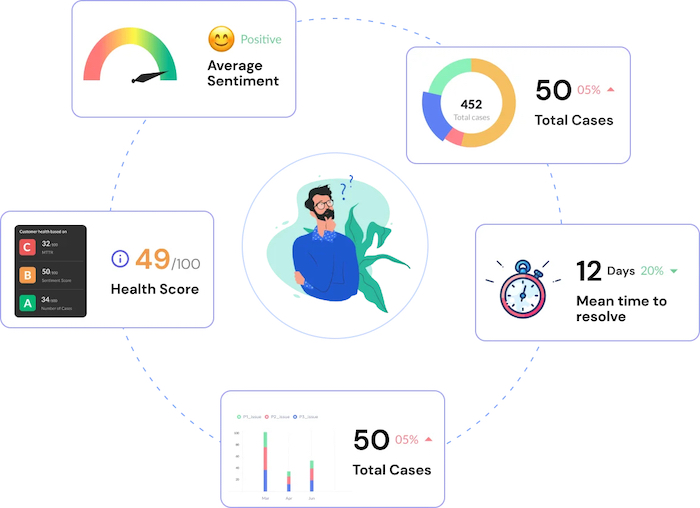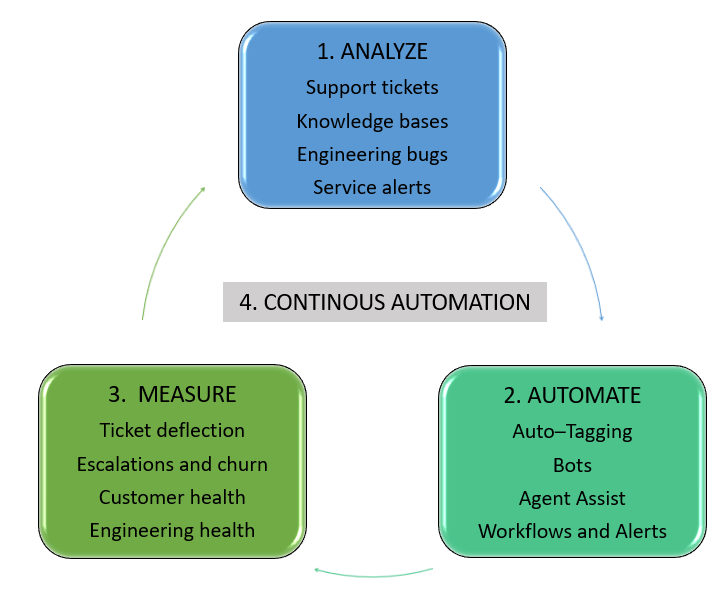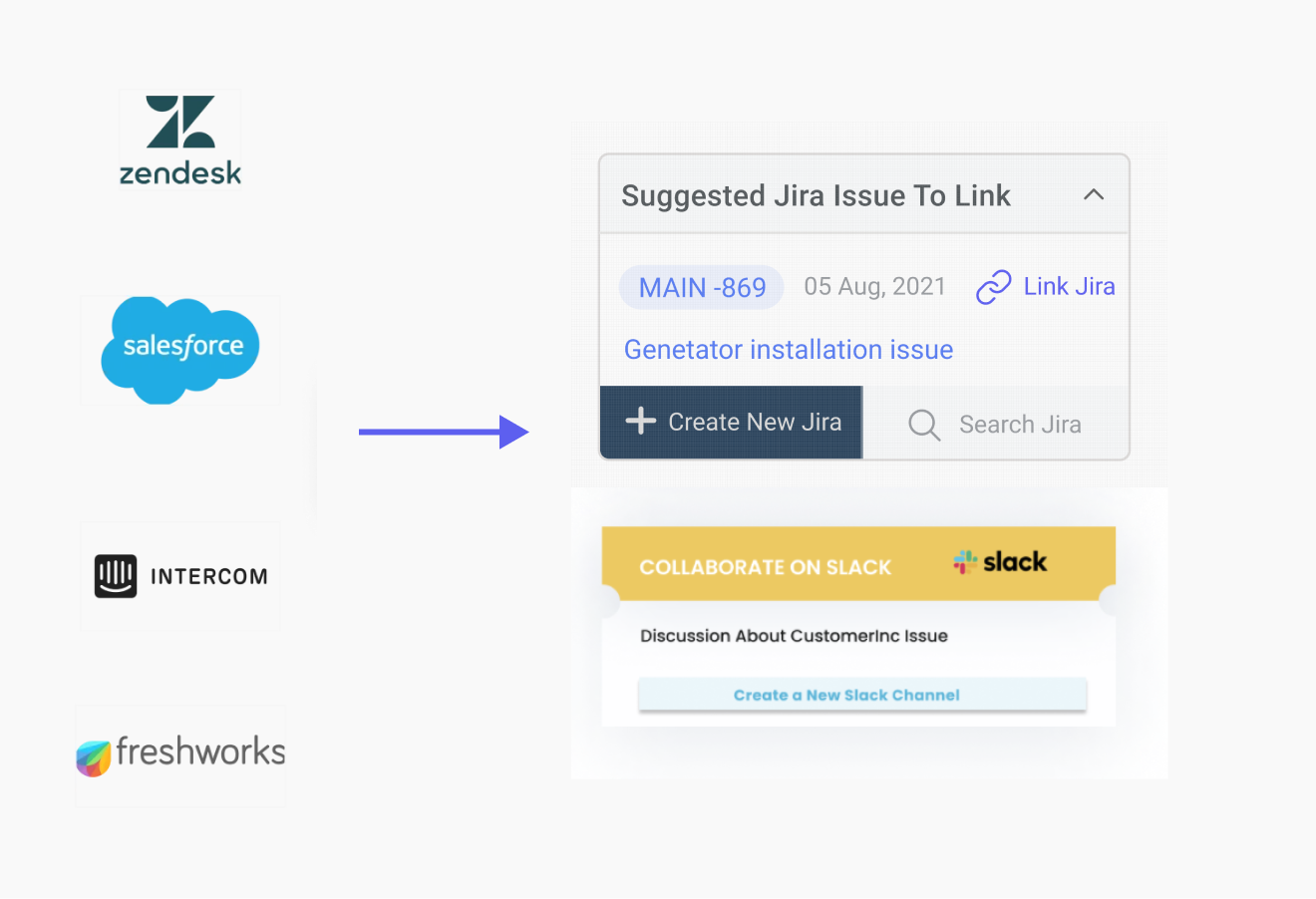Escalate Ticket Meaning: Definition, Process, Benefits & Automation
In the fast-paced world of exceptional customer service and customer support, efficient and effective handling of basic customer inquiries and issues is crucial for maintaining a positive brand reputation and customer satisfaction.
Ticket escalation explained: Ticket escalation is the process of moving unresolved issues to higher levels of expertise or authority within the support team. This clarifies the purpose and benefits of escalation in support operations, ensuring that complex problems are addressed efficiently and service quality is maintained.
Ticket escalation could appear as a challenging predicament for the parties concerned. However, once the ticket escalation process has been fine-tuned, it becomes valuable regarding customer complaints and tackling key issues such as customer attrition. The ticket escalation process is an established protocol that a support team member adheres to redirect an unresolved support ticket to a more senior team member or colleague with more authority. Having a clear ticket escalation process is essential for ensuring efficient and structured handling of escalations, which leads to faster resolutions and improved customer satisfaction.
Nearly 80% of consumers demand greater honesty and transparency from brands when they escalate tickets. Utilizing a ticket escalation system can aid your customer service team in continuously updating your customers informed on the status of their tickets. This helps set expectations for response times and reassures them that their concerns are being addressed. Integrating help desk software can streamline operations and ensure transparency and efficiency in handling customer support tickets, making it easier to document notes, tag escalated support tickets and automate the escalation process. Desk ticket escalation management is a key aspect of using such software, as it helps assign responsibilities, follow clear escalation protocols, and improve overall support operations.
Table of Contents
What is a Ticket Escalation?
When should an escalation be initiated?
Why Effective Ticket Escalation Matters?
8 Tips for Handling Ticket Escalations
How to Predict and Prevent Ticket Escalations
Streamline Support Escalation with IrisAgent
FAQs on Support Escalation
What is a Ticket Escalation?
Support escalation is a process that occurs when a customer’s inquiry or issue cannot be resolved at the first point of contact and must be transferred to higher-level support agents or teams with specialized knowledge of customer issues. Implementing a transparent and optimized service desk escalation process is crucial for maintaining customer satisfaction and ensuring efficient resolution. This process often involves a hierarchical tier system with defined escalation tiers, such as Tier 1, Tier 2, and Tier 3, and the use of ticketing software to facilitate the quick assignment of tickets for efficient resolution. Functional escalation refers to transferring a ticket to a team with the appropriate skills or authority, while hierarchical escalation means escalating the issue up the organizational chain of command when higher expertise or responsibility is needed. The ticket escalation workflow outlines the step-by-step path that tickets follow as they move through the escalation process. While escalation is sometimes necessary for complex problems, excessive reliance on escalations can hinder the overall support process and impact customer experience.
When there is a ticket escalation, the customer must wait for the issue to be resolved. The customer may see the company or service reps in a less favorable light, which could affect the customer relationship in the long run.
If a company puts proper systems and tools in place to avoid these escalations of high-priority tickets, it can see a significant return on investment, both in time and money. According to HDI, the average cost of resolving a customer ticket in the country was approximately $22 in 2019. If a company can prevent a rise of 1,615 level 1 tickets per month (according to the calculation on HDI), it will save an estimated $35,530 per month. This demonstrates how ticket escalation works to ensure that issues are addressed efficiently and by the appropriate personnel.
When should an escalation be initiated?
Initiating an escalation in customer support with in-depth knowledge is a crucial decision that should be made judiciously to ensure the effective resolution of complex or challenging customer issues. While frontline customer support agents are trained to handle a wide range of inquiries, there are specific scenarios that warrant the initiation of an escalation. Here are some key situations when an escalation should be considered:
Complex Tickets: When a customer presents a highly technical or specialized customer issue that goes beyond the expertise of the frontline support agents, an escalation is warranted. Before escalating, it is important to thoroughly understand, replicate, and document the customer's issue to ensure accurate diagnosis and efficient handoff. Complex tickets, such as those involving intricate product configurations, deep system integrations, or intricate software bugs, may require the attention of a more experienced agent or a specialized team member with the necessary expertise for resolution.
Recurring Problems: If a customer repeatedly experiences the same issue despite multiple attempts at resolution, it may indicate an underlying problem that necessitates escalation. Some escalations in these cases may require a specialized team member to identify and address the root cause comprehensively, preventing further recurrence.
High-Priority or VIP Customers: For high-priority or VIP customers, organizations often have dedicated support teams equipped to handle their unique needs. Initiating an escalation for these customers ensures that their concerns are treated as a high priority ticket and receive immediate attention from top-tier support agents, strengthening the relationship and customer satisfaction.
Escalation Requests from Customers: When customers specifically request to escalate their issues, it is essential to honor their request. It demonstrates attentiveness to their needs and indicates a commitment to finding a satisfactory resolution.

Why an Effective Ticket Escalation Process Matters?
The efficiency of a customer service team greatly depends on its ability to manage and resolve ticket escalations and support requests. Effective ticket management and escalation process are crucial to customer service efficiency and to ensure that complex issues are prioritized and addressed by the right personnel promptly and accurately. Consequently, this boosts customer satisfaction and fosters good relationships with the clientele.
Increased Response Times: Without an effective ticket escalation process, escalations often result in delays as the customer query moves through different tiers of support, leading to wait times for customers longer and decreased satisfaction levels.
Resource Allocation: Continual escalations consume more resources in terms of time and personnel, diverting support staff from other essential tasks and potentially overburdening senior support teams. Escalated tickets often require additional resources, such as specialized tools or access to customer data, to facilitate effective resolution.
Operational Costs: Without a ticket escalation process, a higher dependency on skilled support agents can drive up operational costs as organizations may need to hire more experienced staff or invest in additional training. Escalations often require staff with required technical knowledge, further increasing operational expenses.
Knowledge Silos: Over-reliance on specific support agents may lead to knowledge silos, where critical information remains confined to certain individuals, making it difficult for others to handle similar issues effectively.

Escalation Workflow
A well-structured escalation workflow is at the heart of an effective ticket escalation process. It provides a clear, step-by-step path for support teams to follow when customer issues require additional expertise or urgency, ensuring that no customer concern falls through the cracks. By establishing a robust escalation workflow, organizations can streamline ticket escalation, reduce resolution times, and significantly boost customer satisfaction.
To build an effective escalation workflow, it’s essential to start by defining clear escalation criteria. These criteria should outline exactly when a support ticket should be escalated—whether due to complexity, urgency, the need for specialized knowledge, or the risk of breaching service level agreements (SLAs). Support agents must be trained to recognize these triggers and escalate tickets promptly to the appropriate team member or escalation tier.
Modern ticketing systems and help desk software play a crucial role in supporting the escalation workflow. With features like automatic escalation rules, tickets can be automatically escalated based on predefined conditions such as priority level, elapsed time, or SLA thresholds. This automation ensures that high-priority or time-sensitive tickets are never overlooked, reducing customer frustration and helping support teams meet their SLAs.
Manual escalation remains an important part of the process as well. Support agents should have a clear, documented procedure for escalating tickets to more experienced agents or specialized team members when necessary. This might involve moving a ticket from a frontline agent to a technical specialist or from a general support queue to a dedicated escalation team. Having a transparent manual escalation process helps ensure that complex issues are handled by the right people, at the right time.
Communication is another key element of the escalation workflow. Keeping customers informed about the status of their support ticket, the reason for escalation, and the expected resolution time helps manage expectations and builds trust. Proactive updates throughout the escalation process can turn a potentially negative experience into a positive one, enhancing the overall customer experience.
To minimize unnecessary escalations—which can slow down resolution times and overburden senior staff—support teams should be empowered with comprehensive training, access to a robust knowledge base, and the authority to resolve a wide range of issues independently. This not only improves team efficiency but also ensures that escalations are reserved for truly complex or high-impact cases.
Continuous monitoring and evaluation of the escalation workflow are essential for ongoing improvement. By tracking escalated tickets, analyzing escalation history, and reviewing resolution times, support teams can identify bottlenecks, recurring issues, and opportunities to refine the escalation process. Desk software and analytics tools can provide valuable insights to help optimize the workflow and drive better outcomes.
6 Tips for Handling Ticket Escalations
1. Comprehensive Training Programs
Invest in comprehensive training programs that ensure all support agents have basic product knowledge to resolve common issues efficiently, as well as the necessary skills to handle various customer issues. By empowering frontline service agents with more technical expertise, they and higher customer service teams can address a higher percentage of inquiries without the need for escalation. For more on how to optimize and revamp your customer support operations, check out this guide.
2. Knowledge Base and Self-Service Tools
Develop a robust knowledge base and self-service tools that give customers easy access to solutions for common issues. Encourage customers to use these resources before reaching out to support, reducing the volume of repetitive customer queries and basic concerns.
3. Tiered Support Structure
Implement a tiered support structure where ticket priorities are used to determine which issues are escalated to higher tiers—simple queries are resolved at the first level of consistent support escalator, and only more complex or higher-priority issues are escalated to higher-tier agents. This ensures that escalations are used judiciously, and support agents at all levels remain actively engaged.
4. Cross-Training and Job Rotation
Promote cross-training among support agents, enabling them to acquire expertise in multiple areas. Job rotation allows agents to work in different teams or departments, fostering a broader understanding of the organization's operations.
5. Ticket Escalation Process Guidelines
Establish clear, well-defined ticket escalation process guidelines outlining the criteria for escalating issues to higher-level support teams to ensure service level agreements and customer expectations are met in a timely manner. Regularly review and update these guidelines to ensure they align with changing customer needs and business requirements.
6. Customer Feedback Loop
Create a customer feedback loop to improve support processes continuously. Analyzing customer feedback helps identify recurring customer issues and bottlenecks in a streamlined support process, enabling organizations to address these problems proactively.
How to Predict and Prevent Ticket Escalations
Proactive Customer Support

Proactive support ensures that the product or customer issues are resolved before the customer reaches out or even realizes that there was ever an issue. A lot of customer support operations are reactive. They wait for the customer to stumble upon an issue and report it to customer support before any action is taken to resolve it. If customer support cannot resolve the issue, it is likely escalated to the engineering team. Imagine how much time the customer has spent waiting.
However, a customer support agent with a proactive approach will use technology to detect problems before they occur and resolve them before the customer is aware. This saves time for all parties involved.
Integrate intelligent software into your tech stack
Automated and intuitive software can monitor and detect customer behavior or product usage in real time. This type of software saves time and is cost-effective. It predicts potential issues and alerts the appropriate person. With the right software in place, the customer support agent can efficiently prevent ticket issues from happening or, at the very least, resolve them quickly without having them escalated.
Using Artificial Intelligence
With AI, you can automate processes and optimize efficiency by automatically reviewing frequent, repeated issues. AI can use this data to predict potential product usage or business operations outcomes.
Due to the robust and updated knowledge bases that AI solutions gather, customer tickets can be compared with historical data and user context to propose solutions for incoming tickets, thereby avoiding escalating the issues to engineering.
Proactive customer support based on AI solutions can help organizations avoid high ticket volume and engineering escalations. AI-powered tools assist agents in resolving the issue more efficiently before escalation is needed. The customer support team could be empowered to handle the customer query effectively and solve issues themselves with little to no waiting time for the customer.
Streamline Support Escalation with IrisAgent
To optimize customer support processes and reduce support agent dependency, organizations can leverage advanced tools and technologies to streamline support ticket escalation matrix. One such powerful solution is IrisAgent, an intelligent support platform designed to enhance the efficiency of support operations and facilitate seamless support ticket escalation process management. Here’s how organizations can leverage IrisAgent to streamline the support desk escalation process:
Automated Ticket Routing: IrisAgent employs sophisticated machine learning algorithms to route customer support tickets automatically to the most appropriate support agent or team. By analyzing the content of incoming queries, IrisAgent can accurately identify the issue’s complexity and direct it to the right personnel, reducing the need for manual triaging and minimizing response times. Escalations that impact multiple customers are prioritized to prevent widespread issues and ensure rapid resolution.
Intelligent Knowledge Base Integration: IrisAgent seamlessly integrates with the organization’s knowledge base and self-service tools, providing support agents with real-time access to relevant information and solutions. When support agents encounter challenging issues, IrisAgent can suggest relevant articles or resources from the knowledge base, empowering agents to resolve problems without needing escalation.
Smart Escalation Recommendations: Using historical data and machine learning insights, IrisAgent can offer smart escalation recommendations when support agents encounter complex or unusual issues. These recommendations are based on past successful resolution patterns and can guide agents to the appropriate escalation path, ensuring that escalations are handled efficiently and effectively.
Insightful Analytics and Reporting: IrisAgent provides detailed analytics and reporting on support performance, escalations, and resolution times. Support managers can gain valuable insights into support operations, identify potential bottlenecks, and optimize the ticket escalation process based on data-driven decisions.
Customizable Escalation Workflows: IrisAgent offers the flexibility to create customizable escalation workflows tailored to the organization’s unique support needs. Support teams can define specific criteria for escalating tickets to different tiers, ensuring that escalations align with the organization’s support strategy.
Seamless Integration with Existing Systems: IrisAgent can seamlessly integrate with existing customer support and bug-tracking systems, making it easy for organizations to adopt and incorporate the platform into their current support operations without major disruptions.
By leveraging IrisAgent, organizations can streamline support escalation and escalation tickets, optimize support processes, and empower support agents with the tools and insights to handle a wide range of customer inquiries effectively.
FAQs on Support Escalation Process
What is support escalation?
In a ticket escalation process in customer support, a customer's inquiry or issue is transferred from the frontline service desk or initial point of contact to higher-level support agents or specialized customer service teams for resolution. In conclusion words, ticket escalation occurs when frontline support agents cannot resolve the problem due to its complexity, technical nature, or lack of expertise and create escalated tickets.
What are the potential challenges of support escalation?
Support escalation can lead to increased response times, resource allocation issues, higher operational costs, and the development of knowledge silos. Excessive escalations may also increase customer dissatisfaction if the process is not managed efficiently.
What role does customer feedback play in support escalation?
Customer feedback plays a vital role in support ticket status escalation as it provides insights into customer satisfaction, identifies recurring issues, and highlights areas for improvement. Analyzing customer feedback helps refine the ticketing system status escalation guidelines and enhances the customer support experience.
How can organizations strike a balance between self-service and support escalation?
Organizations should invest in comprehensive self-help resources like knowledge bases and FAQs to balance self-service and support to handle ticket escalation well. Encouraging customers to use these resources before regularly escalating tickets or queries helps reduce unnecessary ticket escalations while maintaining accessible ticket escalation paths for complex or critical issues.
How can organizations measure the effectiveness of their support escalation process?
Organizations can measure the effectiveness of their support and escalated ticket escalation process through key performance indicators (KPIs) such as average resolution time, first-contact resolution rate, customer satisfaction scores, and ticket escalation volume. Regularly monitoring and analyzing these metrics allows for continuous improvement and optimization of the ticket escalation process.
When should I escalate a support ticket?
You should escalate a customer support ticket when the issue is highly technical or complex, recurring despite previous attempts, about to breach your service level agreement or agreements, involves high-priority or VIP customers, or requires urgent resolution due to time-sensitive circumstances.
What are the different levels of support escalation?
The different levels of support that manage ticket escalation will typically include frontline agents for basic inquiries for certain support tickets, specialized teams for technical complexities, and higher management for critical issues. Ticket escalation levels ensure efficient problem resolution and optimal resource utilization.
What if the escalation doesn't resolve my issue?
If the initial help desk escalation process doesn't resolve your issue, it may be further escalated to senior management or specialized teams for deeper analysis and resolution. Continuous communication, tracking, and collaboration ensure a comprehensive approach to finding a satisfactory solution.




